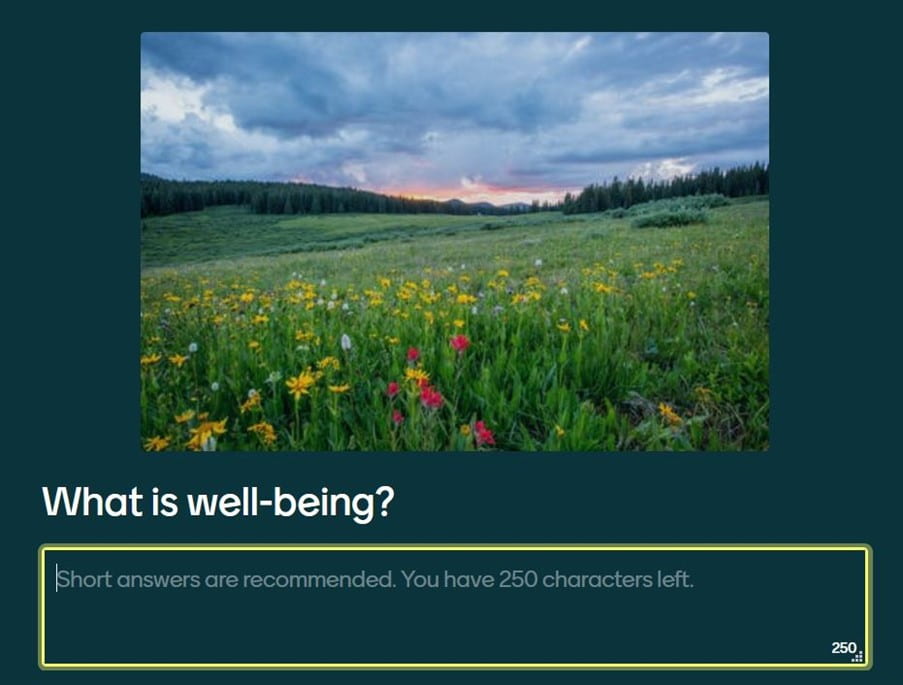By Kassie Dmitrieff, Academic Engagement Librarian UNSW Library and Digital Dexterity Champion, k.dmitrieff@unsw.edu.au
Session 1 – Wellbeing, Disrupted
The first session for the day was an engaging workshop held by Adrian Stagg, Susan Carter, and Cecily Andersen of University of Southern Queensland (USQ).
To start here are my key takeaways from this session:
- The interactivity of this session was amazing, it’s really worth getting to know your options for engaging your audience with the shift to online presentations.
- There is value in committing time to wellbeing in the workplace as a manager rather than expecting your employees to take it upon themselves.
- Behaviours need to be modelled by managers who encourage and foster healthy habits in their employees and trust them to know what works best.
Open Educational Resources in Australia
Now a little bit more about how I got to these takeaways. The presenters for this session are the team behind the textbook ‘Wellbeing in Educational Contexts’ which I consider a hallmark in what an Open Educational Resource (OER) can look like. I have found the Australian tertiary education arena to be reticent to engage with OERs. This is not to say that libraries aren’t all over OERs for example I have even had the experience of making a LibGuide to already existing resources to guide our academics some years ago. I just look around and don’t see uptake in these resources in Australian universities. The Digital Dexterity Champions aim to create and share resources in an open way so I am so sure you will hear more and more from us on this topic in the months to come.
Wellbeing During COVID-19 and Beyond

The session itself covered not only reflections on OERs and the creation of the textbook, but the research that the group has carried out about how wellbeing has been constructed up to and during the COVID-19 pandemic. There were multiple opportunities for attendees to participate along with the presenters, including Mentimeter questions and breakout room discussions.
The discussion I wanted to share was from the first breakout room where we were asked: What does wellbeing in the workplace actually look and feel like – and how do we measure it? One of the people in my breakout room shared that: “after the experiences of COVID19 – what was evident was that WFH [work from home] contributed hugely to staff wellbeing”. The measurement being that staff took less sick days, and there was a huge increase in work output. This mirrors my experience, and I would like to challenge library managers to aim for true flexibility in their ongoing arrangements with staff in ‘COVID-normal’.
Session 2 – Reframing OER practice
Session 2 was a focused session from Adrian Stagg on what has worked and hasn’t worked about the grants structure for OER content creation and utilisation at USQ. The session included more interactive elements that allowed us as the audience to provide feedback to Adrian about what we thought about the process – including what doesn’t work about grants, followed by a deep dive into case studies of OER creation and the community backbone required for successful, ongoing, meaningful adoption and engagement of OERs.
My key takeaway from this session was more simple: How to use your position in the library to encourage OER adoption in tertiary education? Start small and get some wins, know who to share the wins with to make them want more!
Asking the Right Questions
I’m going to be selfish in this part of the post to talk about the question that I asked Adrian during the Q&A. I asked:
“Would you have any advice on how to present OERs to the rest of your institution? The library can only control so much with regards to learning resources – it would make my job so much easier if the chancellery mandated OER use! or encouraged it at all really”.
And Adrian responded that the budget crunch we are all under due to the pandemic is a perfect opportunity to highlight the limitations of subscribed online resources, especially examples where your institution had to buy multiple user access to textbooks at short notice. It helps to have these extraordinary examples to draw from to underscore the problems we have faced in the traditional publishing system. It’s not that OERs are all about the money – but this is often the bridge to understanding that administrators need.
Looking Ahead
The day made a huge impact on me, I will certainly be revisiting both OERs and workplace wellbeing as the year unfolds and we see if the positive changes we were able to make during 2020 are able to be carried into 2021.

Get proficient scholastic help with Dissertation Writing Service UK where master essayists offer first rate help to understudies trying to succeed in their higher examinations.
Dynamic logistics in USA embrace the conceivable fate of procedures. Our adaptable technique adjusts to changing business region requests, empowering constant changes and asset improvement. From creative overall arranging designs to flexible warehousing choices, we engage your store network with the versatility it necessities to remain ahead in the ongoing high speed business scene.
Seek no more for a book publisher in the UK! We are your premier choice for publishing excellence, helping authors turn their manuscripts into captivating books that resonate with readers.